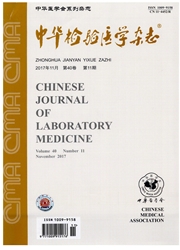

 中文摘要:
中文摘要:
目的通过经全基因芯片扫描分析(CMA)诊断的46例患儿总计携带54个不同临床意义的拷贝数变异(CNV)进行父母来源验证,旨在研究验证结果对不同全基因芯片扫描临床致病性判定的影响.方法回顾性研究.收集2014年8月至2015年12月就诊于新华医院儿童内分泌及遗传科门诊的患儿共46例,经全基因芯片扫描分析产生54个CNV,使用CMA或荧光定量PCR的方法对其进行父母来源验证.结果46例全基因芯片扫描患者总计携带54个拷贝数变异.其中17个为致病性变异,经父母验证后有14个是新发突变,3个遗传自母亲,其中1个是1q21.1缺失综合征,另2个来自母亲的X染色体,分别为Xq27.3q28重复和Xq22.1q22.3重复.1q21.1缺失综合征大多遗传自父母,X染色体上的重复可能因为失活机制而不在母亲身上显现出表型.17个临床判定为致病性的CNV,经过父母验证后仍判定为临床致病性变异.10个临床意义不确定-倾向可能致病的CNV,经验证后3个是新发突变,认为是可能致病性变异,7个分别遗传自父母,判定为临床未知致病性;27个临床意义不确定的变异,经验证后仅1个是新发突变,认为是可能致病性,其他均有父母来源,判定为倾向良性变异.结论对于临床报告为CNV可能致病性应该验证父母来源以进一步研究其致病性,对于临床未知意义的CNV经过父母验证可以初步明确其性质.
 英文摘要:
英文摘要:
Objective To analyze the influence of validating the parental origin to the interpretation of clinical pathogenicity of total 54 copy number variations(CNV)with different clinical significance in 46 patients undergo chromosomal microarray analysis(CMA).Methods A retrospective study.This study enrolled 46 patients conducted in Department of Pediatric Endocrinology and Genetics of Shanghai Xinhua Hospital during the period of August 2014 to December 2015,involving 54 different CNVs detected by CMA.The parental origin of CNVs was examined by CMA or quantitative real-time polymerase chain reaction.Results Totally 54 different CNVs were found in 46 patients by CMA.Seventeen out of the 54 CNVs were pathogenic variations.After validating the parental origin,14 CNVs were proved de novo mutation,while 3 CNVs have maternal origin including 1q21.1 deletion syndrome,Xq27.3q28 and Xq22.1q22.3 duplications which inherited from maternal X chromosome.CNVs of 1q21.1 deletion syndrome often inherited from parents,and no phenotype appears on mother which may be due to the deactivation mechanism of duplications on mother′s X chromosome.Therefore,these 17 pathogenic variations were still considered to be clinical pathogenic significance after validating the parental origin.Ten out of 54 CNVs were variants of uncertain significance-likely pathogenic.After parental original validation,3 CNVs were proved de novo mutation considering likely pathogenic significance,while 7 CNVs have parental origin still judged to be unknown clinical pathogenicity.Twenty-seven out of 54 CNVs were variants of uncertain significance.After validating the parental origin,only 1 CNV was proved de novo mutation considering likely pathogenic significance,while all the others had parental origin considered to be variations likely benign.Conclusion CNVs reported as likely pathogenic should be validated the parental origin in order to further study their clinical pathogenicity,while variants of uncertain significance can preliminary clear its nature by va
 同期刊论文项目
同期刊论文项目
 同项目期刊论文
同项目期刊论文
 期刊信息
期刊信息
